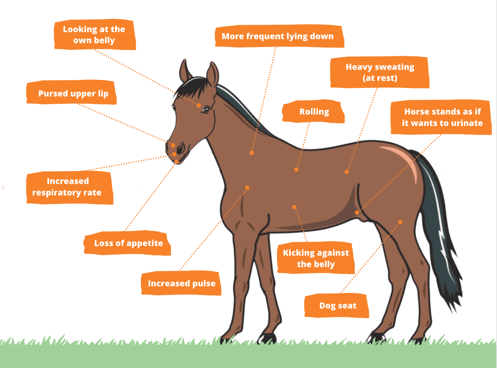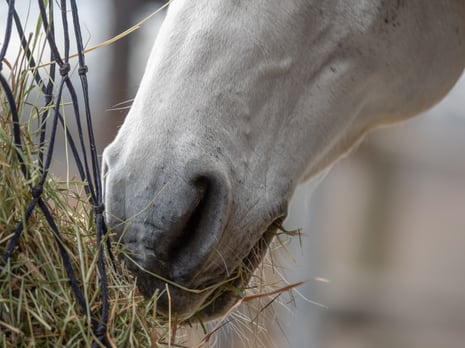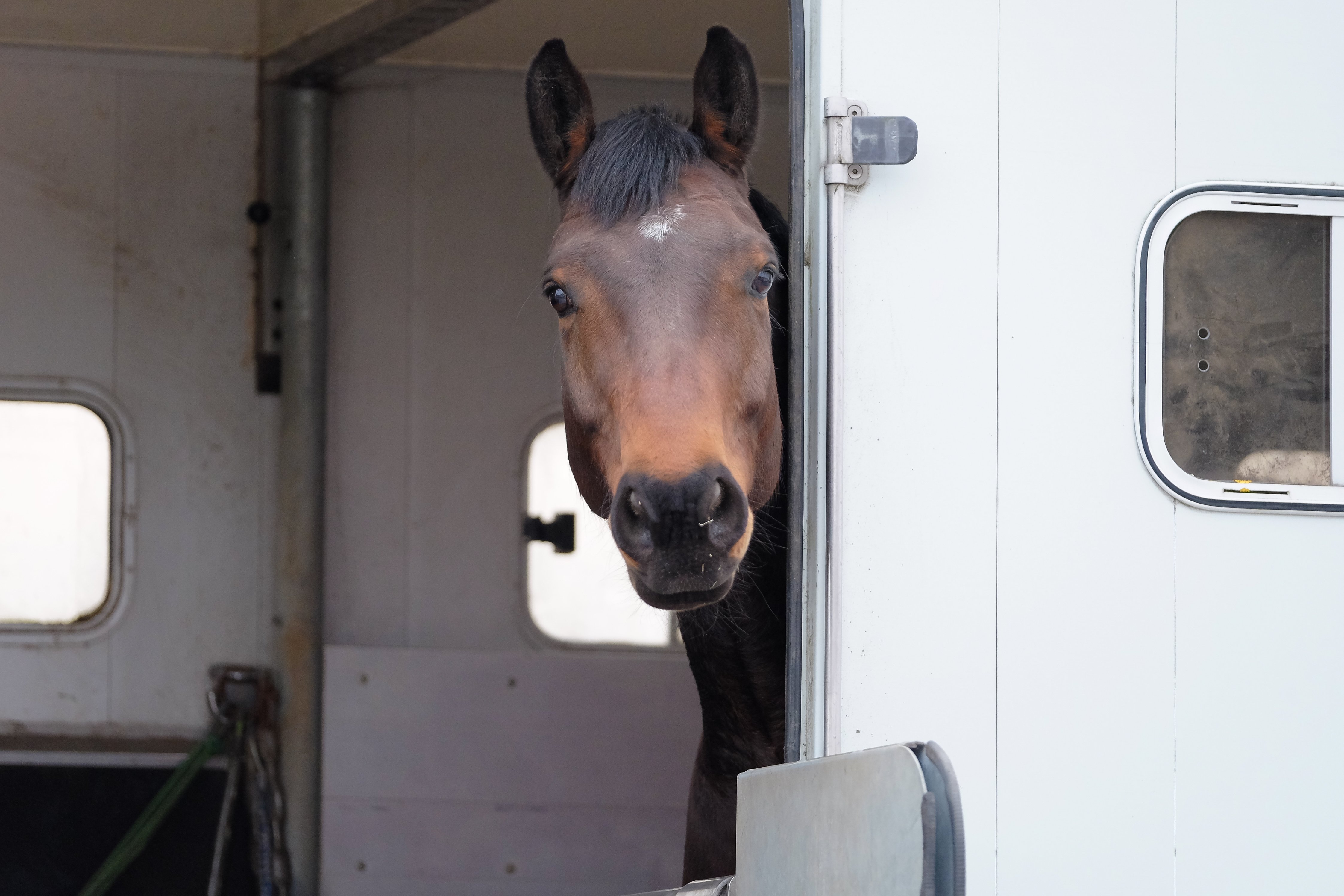Fall time is colic time!
2 min. read time
Audio version – listen to this article easily
Colic is an umbrella term for all digestive disorders and clinical pictures related to the horse's digestive tract. They are always painful for horses and in the worst cases even life-threatening - and unfortunately often complex in their occurrence.
Due to their anatomy, horses are always prone to colic. So if your own horse suffers from the pain of colic, this does not make you a bad owner. It is important to recognise the symptoms of colic in a horse in order to be able to consult your trusted vet quickly in case of suspicion.
Recognising colic symptoms and reacting correctly is important. As there are several types of colic, in this blog article we explain and inform about the different types of colic, symptoms that horses with colic show and what to do if the horse has colic. Many questions - Equine 74 has the answers.
If you are interested in a particular question click directly on the chapter and learn more:
Spasmodic colic
Horses affected by cramping colic suffer from severe painful spasms of the intestine. Cramping colic is caused by incorrect feeding, stress or an infestation of worms.
Sand colic
Horses that are kept in sandy areas and have to take their feed from the ground run the risk of getting sand colic. The ingestion of sand irritates the mucous membrane in the intestine, and with large amounts of sand there is a risk of the large intestine twisting. Horses in sandy areas should therefore not have to take their feed from the ground and should always have fresh water available.
Gas colic
Gas colic is caused in horses by ingesting feeds that produce gases in the horse's stomach. These feeds included, for example, bread, clover and fermented grass. This gas accumulates in the intestine and causes painful expansions. In addition, gas accumulation can cause displacement and entrapment of the intestines, which is also very painful for the affected horses.
Stomach overload
Stomach overloads are divided into primary and secondary overloads. A primary overload of the horse's stomach is caused by swelling feed. A secondary stomach overload, on the other hand, is a result of intestinal blockage or twisting. In both primary and secondary gastric overload, the horse's stomach expands unnaturally, which is very painful.
Intestinal obstruction
Intestinal obstruction in horses occurs when the muscles of the intestine stop working because they are cramped or paralysed. Tumours growing on the intestinal wall can also cause intestinal obstruction.
Intestinal displacement
There are two types of intestinal displacement in horses: to the left and to the right. In a shift to the left, part of the large intestine is displaced in a space between the left kidney and the spleen. In the second variant, the appendix is affected. A displacement of the large intestine is usually caused by gases in the horse's intestine trying to escape, pushing the intestine under great pressure into all possible corners of the abdomen.
Intestinal impaction
Intestinal impaction in horses is only possible if there are gaps in the horse's muscles. The intestine then slips into these gaps and becomes trapped there.
Large intestine constipation
The main reason for constipation colic in horses is insufficient water intake. Due to the lack of liquid, the feed mush in the intestine becomes too solid and thus clogs the horse's digestive system. But too little exercise, incorrect feeding or bad teeth can also promote constipation. If the horse is not able to chew its food properly, this will promote constipation.
Small intestinal blockage
Small intestinal blockage in horses is usually caused by incorrect feeding. For example, feeding grass clippings can be the trigger of small intestinal blockage.
Here you can learn why colics often occur after the intake of concentrate.
Depending on the cause and the underlying clinical picture, the symptoms can vary. The most common symptoms of colic in horses include:

However, it is also important to know how your horse normally behaves. Your horse may enjoy rolling around in the pasture. But if this is not usually the case and you can observe other "fitting" symptoms, then you definitely have to act. So, good animal observation is a crucial aspect to recognise if your horse has health problems.
Colic is common in horses because the digestive tract inside the horse is simply not as solidly attached as it should be. Based on this problem, a wide variety of digestive disorders arise in horses.
In addition, colic in horses can also be promoted or even caused by incorrect feeding. In the stable, feeding management is still relatively simple, but in the pasture there is a danger that strangers will feed horses without asking permission. This should be prohibited with the help of signs to avoid colic.

The digestive disorders that occur are triggered by constipation, stomach ulcers or intestinal ulcers, among other things, and are therefore not contagious. However, it can happen that horses in the same environment also fall ill because they are exposed to the same circumstances.
The word "colic" is most often used to describe a disease.
Liver and kidney problems are only two examples of a long list of diseases and events that can be expressed by or lead to colic. Colic can also occur in connection with births (both those without and those with complications), kidney and bladder stones, liver diseases, heart problems or poisoning.
A clear classification as a disease or symptom is therefore not possible.
A colic operation costs an average of €7,069. However, the costs vary greatly as there are different forms of colic, each requiring a different operation. Furthermore, the costs can vary from vet to vet. However, not all colic needs to be treated directly with surgery.
We have put together 30 tips to help you react quickly and correctly in case of colic.
Basically, you should always stay calm and contact your vet immediately. Of course, this also applies if you "only" suspect colic. It is better to call your vet once too often than once too little.
Then you should take your horse to a place where an examination is possible without any problems, this can of course also be the horse box. In some cases, it can also help if you take your horse for a slow walk or at least a walk around. On the one hand, this helps you to bridge the waiting time, and on the other hand, you can distract your horse from the pain.
However, if the pain is too severe for your horse, it is better to keep him in his stall until the vet arrives. He will first check your horse's heart and respiratory rate and take his body temperature.
An elevated temperature is a very reliable indicator of pain - especially in connection with other symptoms. The colour and blood flow of the mucous membranes are also checked.
It would be a great help in this situation if you had documents at hand that could be used to understand the animal health situation of your horse.
It is not easy to actively prevent colic in horses because of the horse's anatomy.
Nevertheless, there are a few points that can at least reduce the probability of colic occurring.
Equine 74 Gastric
Buffers the excess acid in the horse's stomach instead of blocking it.
Equine 74 Stomach Calm Relax
Supports the nervous horse stomach in stressful situations.